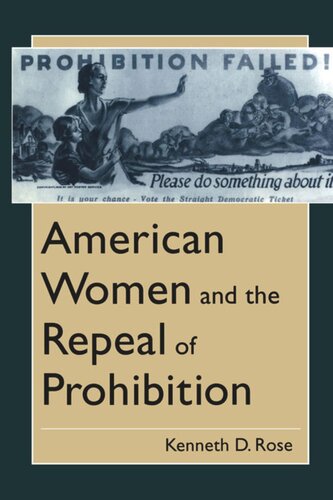

Most ebook files are in PDF format, so you can easily read them using various software such as Foxit Reader or directly on the Google Chrome browser.
Some ebook files are released by publishers in other formats such as .awz, .mobi, .epub, .fb2, etc. You may need to install specific software to read these formats on mobile/PC, such as Calibre.
Please read the tutorial at this link: https://ebookbell.com/faq
We offer FREE conversion to the popular formats you request; however, this may take some time. Therefore, right after payment, please email us, and we will try to provide the service as quickly as possible.
For some exceptional file formats or broken links (if any), please refrain from opening any disputes. Instead, email us first, and we will try to assist within a maximum of 6 hours.
EbookBell Team

4.8
64 reviewsIn 1933 Americans did something they had never done before: they voted to repeal an amendment to the U.S. Constitution. The Eighteenth Amendment, which for 13 years had prohibited the manufacture and sale of alcoholic beverages, was nullified by the passage of another amendment, the Twenty-First. Many factors helped create this remarkable turn of events. One factor that was essential, Kenneth D. Rose here argues, was the presence of a large number of well-organized women promoting repeal.
Even more remarkable than the appearance of these women on the political scene was the approach they took to the politics of repeal. Intriguingly, the arguments employed by repeal women and by prohibition women were often mirror images of each other, even though the women on the two sides of the issue pursued diametrically opposed political agendas. Rose contends that a distinguishing feature of the women's repeal movement was an argument for home protection, a social feminist ideology that women repealists shared with the prohibitionist women of the Women's Christian Temperance Union. The book surveys the women's movement to repeal national prohibition and places it within the contexts of women's temperance activity, women's political activity during the 1920s, and the campaign for repeal.
While recent years have seen much-needed attention devoted to the recovery of women's history, conservative women have too often been overlooked, deliberately ignored, or written off as unworthy of scrutiny. With American Women and the Repeal of Prohibition, Kenneth Rose fleshes out a crucial chapter in the history of American women and culture.